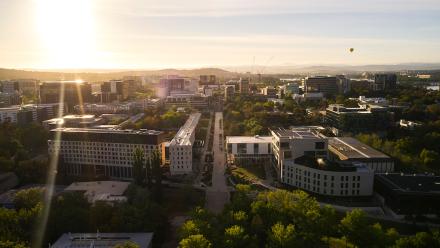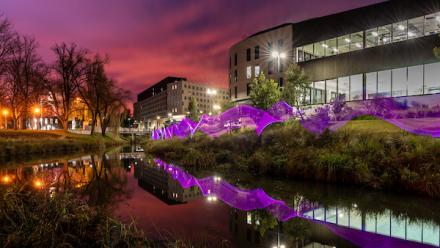The view of ANU from the hill
The great strength of economics at ANU is that it combines rigour with purpose – engaging with the best thinkers around the world, but also alive to the challenges of Australian policy problems.
ANU has an enviable reputation in developing high quality public policy, as well as the people who implement it.
Many of the current Canberra and region Federal politicians have strong links to ANU, as alumni and former staff members.
ANU Reporter asked four of them to reflect on their memories of ANU, the University's place within Australia and the world and what role ANU should play in the future of the ACT.
Hon Dr Andrew Leigh MP, Member for Fraser
It's not often that someone contacts you about a job on the day that applications close but that's what happened with my career at ANU.
Out of the blue, in December 2003, I received an email from Deborah Cobb-Clark, describing a position at what was then the Economics Program in the Research School of Social Sciences. Intrigued, I scrambled together an application.
A few weeks later, I found myself chatting with Deborah, Bob Gregory and Bruce Chapman about what the role entailed. They described a collegial culture, with international visitors a regular part of the group.
The main performance indicator was your ability to publish in internationally recognised economic journals. Engagement with Australian policymaking was encouraged.
Deborah provided the government with ideas on social policy and immigration; Bob on labour markets and macroeconomics; Bruce on how to apply income-contingent loans to everything.
Over the next six years, I never once regretted saying yes to that job offer. Seminars were a time for penetrating questions, but not nastiness.
In economics, the best thing you can do for a colleague is to find the big flaw in their research and help them fix it. Colleagues like Alison Booth, Tim Hatton, Xin Meng, Paul Frijters, Bob Breunig and Chris Ryan helped debug plenty of my research papers.
We worked in the HC Coombs Building, named after one of Australia's great public policy economists.
I'm convinced the Coombs Building was constructed to resemble an Escher drawing. The honeycomb pattern meant that you would sometimes see a lost visitor walk past your office, and then a few minutes later come past a second time. It took newcomers a while to figure out that the first digit in the room number didn't signify the floor, but the 'zone' in which the office was located.
For those of us who worked there, the Coombs Building succeeded because its centre was a thriving commons space, where faculty, students and staff could get together to share ideas.
Like Trevor Swan and Fred Gruen in earlier days, those in senior positions encouraged a sense of egalitarianism. What counted was the quality of your ideas, not your spot in the pecking order.
My PhD students taught me a great deal about their areas of expertise. In the classroom, I quickly learned the truth of the maxim that you don't really understand something properly unless you can teach it to someone else.
Near the end of my six years at ANU, the Coombs group of economists joined the School of Economics to form the newly-created Research School of Economics, under the leadership of Warwick McKibbin.
The great strength of economics at ANU is that it combines rigour with purpose - engaging with the best thinkers around the world, but also alive to the challenges of Australian policy problems.
It's no surprise that when you open an econometric textbook, you'll find a discussion of Trevor Breusch and Adrian Pagan's test for heteroskedasticity. But it's no accident that ANU economists have often served on the Reserve Bank Board, advised governments and written op-eds in the popular press.
Having moved from being a professor at ANU to the federal member for ANU, I'm regularly back on campus attending events, joining panels, or giving guest lectures.
Indeed, one of my former colleagues joked that I now do more teaching at ANU than when I was employed there.
Each time I return, I see the university finding new ways to broaden the horizons of students and staff, whether through the National Security College at Crawford, the Australian Centre on China in the World, or a revamped student bar. Our nation is more thoughtful, better-governed and more outward-focused because of ANU.
Download our free ANU Reporter app to continue reading this story, including pieces from Senator Zed Seselja, Gai Brdotmann MP and Dr Peter Hendy MP.
Each new edition will automatically download to your Newsstand.
Don't have a tablet or an Android phone?
Subscribe to receive the next print edition of ANU Reporter.


